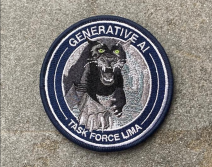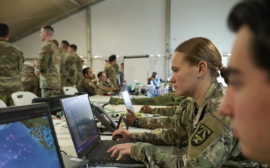Experiments enabled a CJADC2 minimum viable capability—but it’s not fully accessible yet, Pentagon says

The Defense Department’s Chief Digital and Artificial Intelligence Office met its goal of supplying the U.S. military with a minimum viable capability for Combined Joint All-Domain Command and Control, via the eighth iteration of its Global Information Dominance Experiment (GIDE) in December. But due to legislative and other hurdles, that tool is not yet fully accessible for widespread use, according to a senior official.
Deputy CDAO Margaret Palmieri provided new details on Wednesday about the Pentagon’s achievements in GIDE 8 — and what’s to come in the next experiments in the series.
“We’re going to do an up-brief on GIDE 8, internal to the building, in a week or so. So, I’ll keep my comments a little bit more vague than if we had already briefed them out [to Defense Department leadership]. But we did” meet that aim to produce an MVC, Palmieri said at a Hudson Institute event.
In 2022, Deputy Defense Secretary Kathleen Hicks tasked the CDAO with relaunching and reinvigorating the GIDE series, which was previously facilitated by North American Aerospace Defense Command and U.S. Northern Command.
For the newest GIDE projects, the CDAO was explicit in its intent to help test, optimize and integrate data systems with AI, to enable the realization of the Pentagon’s nascent CJADC2 construct for next-generation command and control.
“That minimum viable capability is largely a connection of existing capabilities that we have today that have shared data in new ways — and have brought together a combination of new applications and new data services, with users, to create better workflows,” Palmieri said.
“Now that we have done that in an experimentation environment, there are a couple of things that we need to consider as we bring them into operations. One is a full appropriation in [fiscal 2024], which is absolutely critical. We doubled-or-more our budget in the CDAO from [fiscal 2023 to 2024], and we don’t have any access to that funding right now to make minimum viable capability truly accessible and robust across the [enterprise]. And so we’re really excited about the potential for an appropriation,” she explained.
That money can’t currently be tapped into because federal agencies are operating under a short-term continuing resolution.
Still, Palmieri noted that participants in the latest GIDE iterations have made new and informative connections inside of experimentation — where they deal with live data and live networks in real time — that can be adopted in their day-to-day processes moving forward.
“Absolutely, we have a new set of connections across multiple data fabrics and applications. In GIDE 9, we are going to align with a couple exercises the Army’s doing in Project Convergence 4 — because we really want to see how the combatant commands and the joint task forces now take that down to a tactical level with a service,” Palmieri said.
That will happen in the March time frame, she confirmed.
After that, for GIDE 10, the CDAO plans to engage with Indo-Pacific Command’s Valiant Shield exercise series, which is a U.S.-only, biennial field training exercise that, historically, focuses on integrating joint training in relation to current operational plans.
“We’re really trying to take GIDE to align with existing activities and start to bring those data connections closer to stuff that people are already doing,” Palmieri told DefenseScoop.






